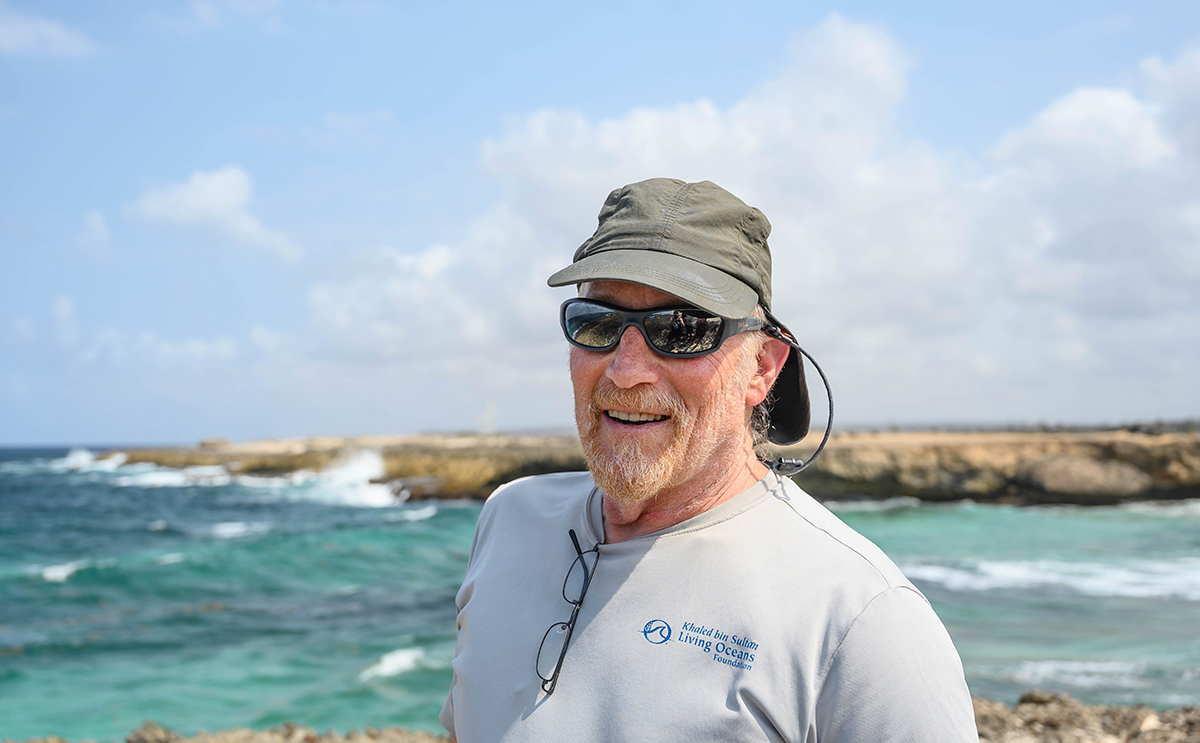The Gilbert Morgan Smith Medal recognizes Dr. Robert S. Steneck '73 for his contributions to the conservation of marine life.

University of Maine marine ecologist Dr. Robert S. Steneck '73 was recently recognized by the National Academy of Sciences (NAS) for his life's work focused under the sea.
According to NAS, the Gilbert Morgan Smith Medal recognizes recipients for their "excellence in published research on marine or freshwater algae" and dates back to 1968 in honor of renowned marine botanist Gilbert Morgan Smith.
The award is "presented every three years and consists of a gold-plated bronze medal and a $50,000 prize."
Steneck has come a long way since graduating from BW in 1973 with a degree in biology and geology.
Oceans cover more than 70% of the Earth's surface, but that vast area did not scare Steneck away from studying the structure and function of coastal marine ecosystems to better understand the organisms living there.
Though his main laboratories are in the Gulf of Maine and the Caribbean, he has also worked extensively throughout the tropical Pacific, studying coral reefs from biological and geological perspectives and focusing on the food webs, structures and dominant organisms in coastal marine communities.
Steneck's research on lobsters, sea urchins and fish stocks within kelp forests led to the development of ecological approaches to fisheries co-management. He also sought to investigate how degraded coral reefs recover from disturbances and what drives the recruitment of corals and other marine organisms.
The NAS stated that his research "provides key insight into overexploitation, species invasion, and a warming climate in ecosystems from the Gulf of Maine to the Great Barrier Reef. His tropical research on how juvenile coral settle and grow on coral reefs, and why improved fisheries management aids in how reefs recover from disturbance, has highlighted the importance of developing an ecosystem approach to reef conservation."

At his 50th BW reunion, Steneck was asked to recall a favorite faculty member. His answer was biology professor John Miller, saying "BW launched my career in marine sciences — it is odd that happened hundreds of miles from the ocean."
While Steneck had been scuba diving since the age of 10, he did get hooked on studying aquatic systems as a BW undergrad.
"One of my professors had a very interesting experiment set up, and I got into studying the freshwater algae," he recalls. From there, his interest in marine life only grew.
"Professor Miller thought that I should go to some marine settings, so I went to the Caribbean to study coral reefs in St. Croix (U.S. Virgin Islands) and immediately thought it was much more interesting than freshwater." From there, his interest in marine studies only grew.
It was in St. Croix that he was offered a job to study coral reefs, which set the stage for his success in the highly competitive marine biology field.
"I loved coming up with my own research … and what I liked about basic research is that it is curiosity-driven. For me, the combination of studying something that is not known scientifically and could be useful and is of interest to me, has led me to stay so involved in what I do."
Steneck admits to having doubts about his chosen path early in his career.
"When I graduated with my Ph.D. from Johns Hopkins and was hired right away by the University of Maine, I wondered, 'Do I have the skill set to contribute anything that's scientifically valuable?' because most of my research was very curiosity driven."
Steneck says that when he found his research niches, the doubt faded, and his impact grew.
"Being at BW gave me a lot of experience as a budding biologist, so I have a lot of warm feelings about BW," he said. "Even after being a professor at the University of Maine, I thought that if I found myself at a larger university ... when I first went to college, I might not be where I am today."
"At BW, due to the smaller classes, I was able to connect with fellow students and faculty in the biology department, and I was able to get good advice," he remembers.
A member of the Alpha Tau Omega (ATO) fraternity and the soccer team, Steneck says he grew in and out of the classroom.
"I was a photographer in high school, but I didn't have a great camera, and when I volunteered to become a photographer at The Exponent, I got better equipment, and it allowed me to do something I wanted to do: take pictures," said Steneck, delving deeper into his time at BW.

Steneck continues his research on coral reefs and coral spawning, but he also has other projects planned for the future.
Recently, he was added to the editorial board of Science Advances, the journal of the American Association for the Advancement of Science, where he evaluates and reviews papers for publication.
In November, he shared that he will travel to Bali, Indonesia, but his most significant focus right now is writing a book on coral reefs.
"I've been working every day as I always have … and it's because I love what I do," he said.
For Steneck, a true passion for his work continues to keep him thriving and making a difference in his chosen field.